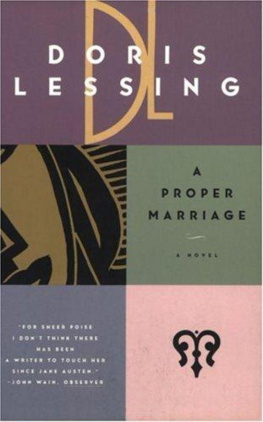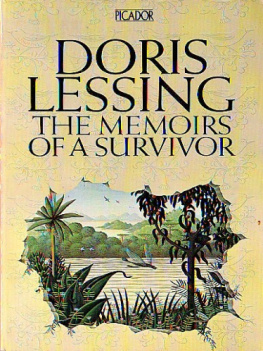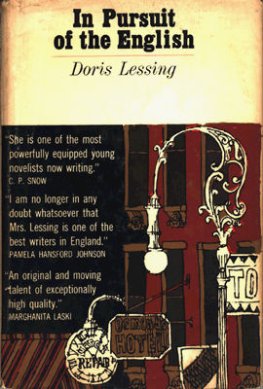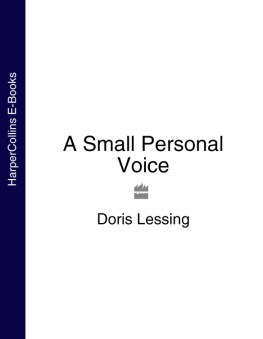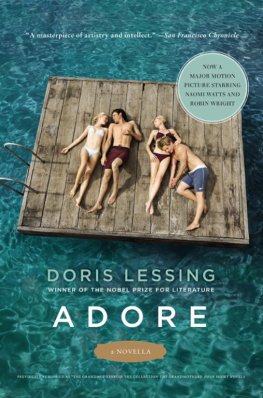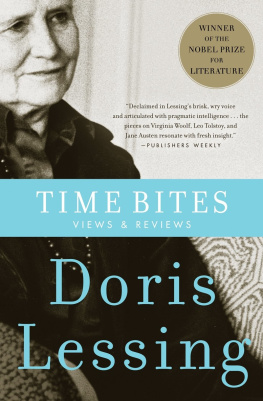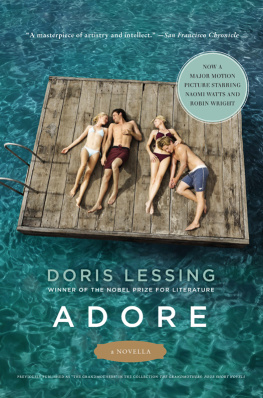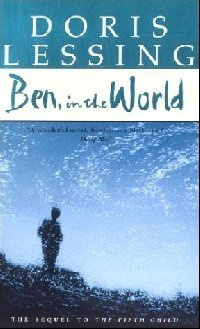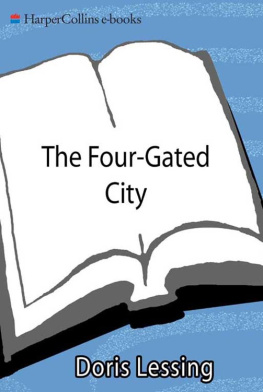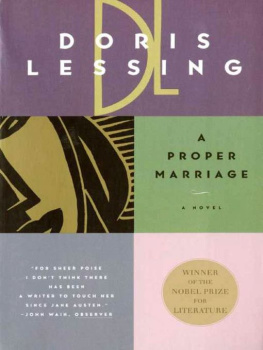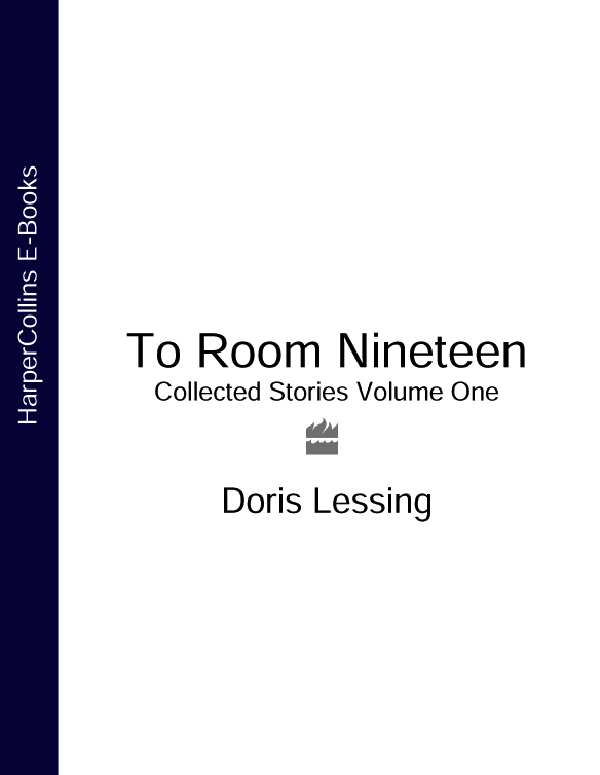These stories have appeared previously in paperback in the following editions: The Habit of Loving, The Woman, Through the Tunnel, Pleasure, The Day Stalin Died, Wine, He, The Eye of God in Paradise and The Witness in The Habit of Loving; The Other Woman in Five. The rest of the stories appear in A Man and Two Women.
All these stories have lived energetic and independent lives since I wrote them, since they have been much reprinted, in English and in other languages. None has been more anthologized than Through the Tunnel, mostly for children. I often get letters from children about it, and adolescents too, for it seems that fearful swim under the rock beneath the sea expresses their situation, or is like an initiation process. It was written because I watched a nine-year-old boy, in the South of France, longing to be accepted by a group of big boys, French, but they rejected him, and then he set challenges for himself, to become worthy of them. But, curiously, when the group turned up again some days later, the English boy had proved to his own satisfaction that he did not need them. I did not set out to write the tale for children, but this raises the whole question of writing stories especially for children. Another story, or short novel, which children like, is The Fifth Child. Italian adolescents, chosen from schools all over Italy, gave it a prize over other books from different parts of the world. Who would have thought that grim tale would appeal to children?
The Habit of Loving made a brilliant one hour television film, with Eric Portman. It was written because I - then fortyish - fell in love with a handsome youth, while an eminent and elderly actor was in love with me. The reversals of sex and situation from life to fiction would make an interesting exercise for those who enjoy that kind of psychological detective work.
One off the Short List earned approval from women, and, interestingly, from men too. I associate it with the Sixties, when it was written, for more and more that decade seems to me a comedy of sexual manners and mores. No one knew how to behave; there were no rules at all. Was this for the first time, ever? I was angry when I wrote the story, but now memories of that time make me laugh. Barbara Coles says to the seducer Graham, But you dont even find me attractive - defining a good deal more than her own situation, for most of the sexual dance was to do with power games, one-upmanship, domination, and nothing to do with attraction, let alone love, sweet love.
To Room Nineteen is another story much translated. Recently in Hong Kongs Chinese University the professor who was teaching it wanted me to explain to his students - and, clearly, to him - the point of the story, which to him was that a woman needed privacy so much that she died for it. This need for privacy, said he, is foreign to their culture. (But perhaps not for long: a woman in Beijing recently wrote an applauded novel inspired by Virginia Woolfs A Room of Ones Own.) The famous culture gap, in this discussion, proved unbridgeable. I myself have never understood this story. I do not believe for a moment that Susan Rawlings knew what it was she wanted. She was driven, but by what? She was in love with death, that is certain, but why, when she had everything any reasonable person could want. A couple of German students in Berlin asked why these intelligent and socially responsible people did not go to a marriage counsellor. The storytellers riposte, that then there would be no story struck me, as well as them, as frivolous. Yes, they were raising literary questions rather more fundamental than they seemed to know. But the story comes out of some hidden place not only in me, but in many women of our time, otherwise it would not have proved so popular with them. My association is with Hardys heroine, Sue Bridehead, who said that there would come a time when people would choose not to live, or with Olive Schreiners heroine who said, Im so tired of it, and tired of the future before it comes. A kind of moral exhaustion. I believe we do not understand the reasons for these tides of feeling as well as we think we do. And sometimes I wonder if our clever methods of birth control have not struck deep into both mens and womens belief in themselves - into regions much deeper and more primitive than are amenable to sweet reason.
The Eye of God in Paradise is saturated in the atmosphere of the sad and frightened time after World War Two, in Europe. I was in Germany, and I did see and experience people and places that went into the story. I visited a mental hospital, like the one I describe - and one ward in it later went up to make a scene in The Fifth Child. But that it is set in Germany is not the point at all. It is about the under-soul of Europe, the dark side where wars and killings and perversions are bred.
England versus England is often printed in magazines and collections outside this country. Other people look at us, and see what I saw when I wrote it: the depredations of our class system. I was in a mining village near Doncaster for a week, in a miners family, and I saw a good deal of what is described.
Between Men made a very funny half-hour television film. Television companies took more risks then than they do now.
A Woman on a Roof is liked by young people. It would make a half-hour film, and it nearly did.
The Day Stalin Died is appreciated by old Reds everywhere. When I wrote it, so I was told, the Communist Party high-ups laughed, but in public had to disapprove of it. It was the tone that was wrong: it does not do to treat serious matters lightly.
How I Finally Lost My Heart is one of my favourite stories, but not necessarily other peoples.
Two Potters has never been one of my best-liked tales, but authors have to resign themselves to having unloved favourites. Another tale - this time a novel, also had as a basis or theme a serial dream - The Summer Before the Dark - and both have for me the attraction and curiosity due to the hidden sides of ourselves. The continuing dreams of the vast dusty plain, the fragile and mortal mud houses and the old potter, went on for a decade or so, and were as interesting to me as an old and much-loved tale. Or visits to a country one has known well and left.
A Room has the same quality - for me - of a world as real as our daytime world, where time slips and slides, and people we have never met are as familiar as old friends.
Wine, a very short story, is a distilling of a four-year-long love affair.
He has sometimes annoyed feminists, but I think it tells the truth about many womens feeling for men.
Doris Lessing, 1994
In 1947 George wrote again to Myra, saying that now the war was well over she should come home again and marry him. She wrote back from Australia, where she had gone with her two children in 1943 because there were relations there, saying she felt they had drifted apart; she was no longer sure she wanted to marry George. He did not allow himself to collapse. He cabled her the air fare and asked her to come over and see him. She came, for two weeks, being unable to leave the children for longer. She said she liked Australia; she liked the climate; she did not like the English climate any longer; she thought England was, very probably, played out; and she had become used to missing London. Also, presumably, to missing George Talbot.


